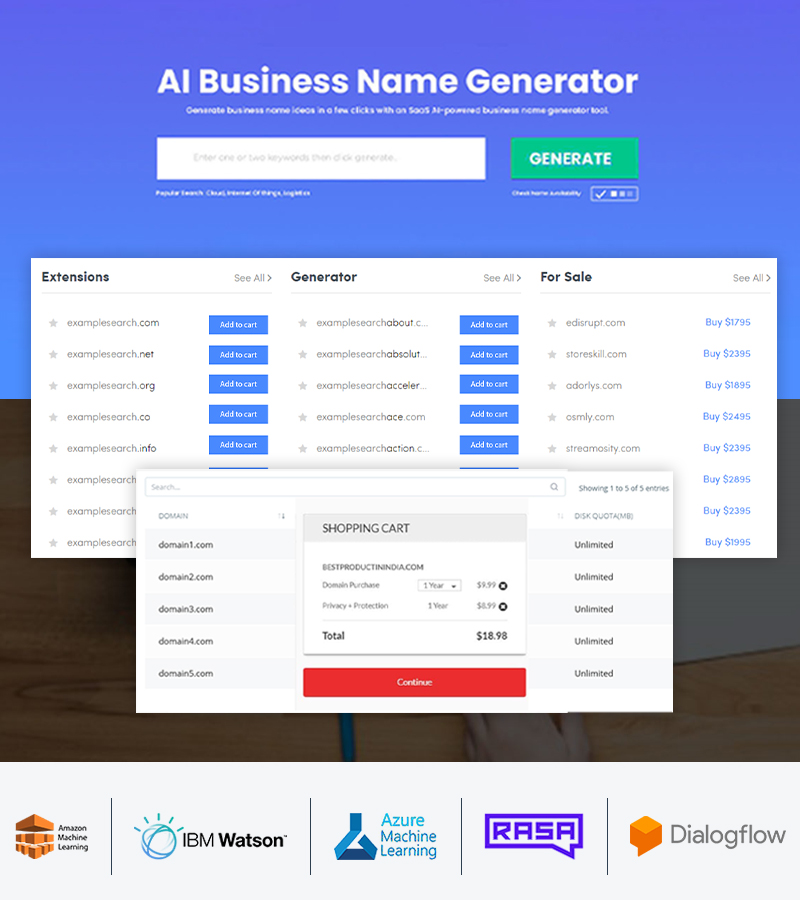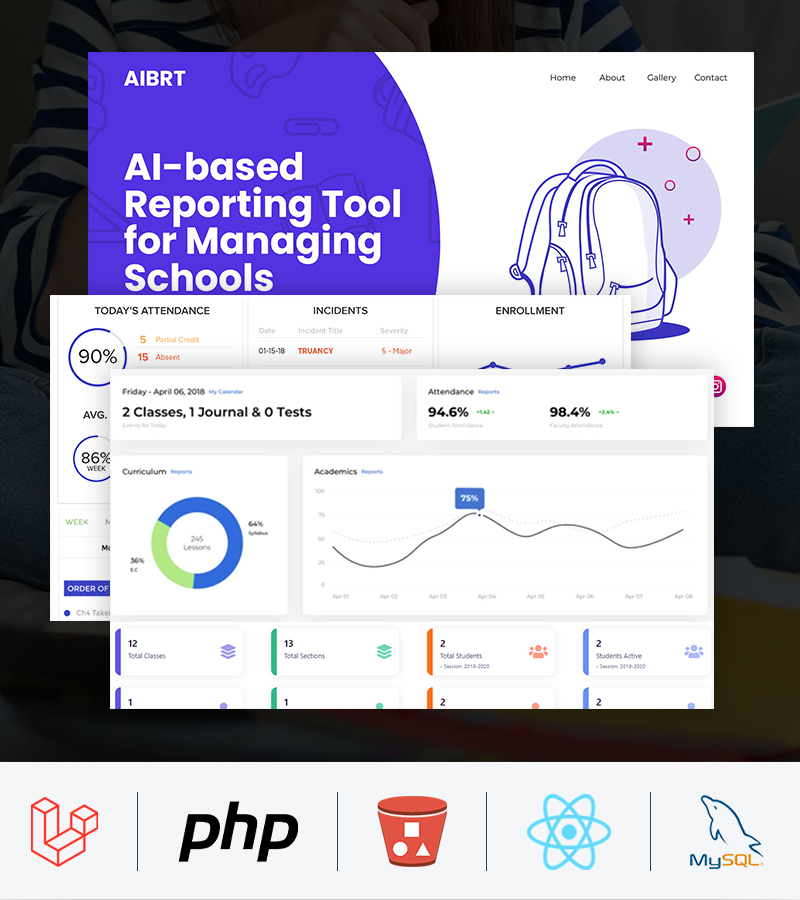Generative AI Services
Step into a new era of content generation and productivity. Matellio lets you reinvent your business with the transformative technology behind platforms like ChatGPT, DALL-E, and more. Embrace the future of AI-driven innovation and stay ahead of the competition with our expert generative AI development services.
- Faster Innovation
- Enhanced Creativity
- Digital Transformation
- Lesser Costs
- Exceptional UX
- Custom AI Solutions
Get In Touch With Us
Why Generative AI Development Services for your Business?
Generative AI is set to revolutionize businesses, technology, and society. To thrive in this transformative era, it is crucial to adapt generative AI to reshape enterprise, redefine human potential, and uphold AI ethics while driving swift technological advancements. Matellio’s generative AI development services enable this transformation through custom-made industry solutions and advanced design frameworks, empowering enterprises to realize their envisioned goals. We empower companies to unlock generative AI's potential, optimize operations, and drive innovation. Stay ahead of the competition with our forefront generative AI services for boundless growth.
of business leaders report cost reduction through AI adoption.
of businesses plan to increase AI investment despite economic challenges.
of executives consider AI foundation models essential for future strategies.
Generative AI Development Services We Offer
Augment a new business reality with generative AI

Generative AI Consulting
Seek services that offer expert advice and guidance on the most effective strategy for designing a generative AI solution aligned with your project’s unique needs and objectives.

Generative AI Model Development
With expertise in ML algorithms such as RNNs, transformers, GANs, and autoencoders, we create, customize, and train generative AI models according to your business needs.

Generative AI integration
We provide integration with cloud-based products, legacy software, and platforms, along with plugin development services to enhance interactions with AI tools.

Upgrade and Maintenance
Our post-production optimization services encompass upgrading and maintaining the model to align with the latest AI trends.

Fine-Tuning Models
Through techniques like transfer learning, data augmentation, hyperparameter tuning, and more, we can fine-tune generative AI models.

Enterprise Assistance Tools
We can build chatbots or add text generation, audio generation or video generation capabilities to your already existing applications or platforms.
Looking for an Experienced Generative AI Development Company? We Fit the Bill!
Why Matellio for Generative AI?
Let Tech Prowess Meet Our Cross-Industry Expertise
Redefine your business with generative AI and become the next big thing in your industry
Technologies We Use for Generative AI Project Development
Tailored Technology Selection: We Leverage the Right Technologies for Your Generative AI Project






Our Customer Success Story
Frequently Asked Questions
1. What is generative AI technology?
Generative AI a specialized branch of artificial intelligence. It is capable of creating content material encompassing text, photos, audio, or even synthetic data.
Although the concept of generative AI dates back to the 1960s, it took a leap forward in 2014 with generative adversarial networks (GANs), permitting the technology of lifelike photographs and motion pictures portraying actual individuals.
Recent advancements in transformers and large language models (LLMs) have further improved generative AI’s capability. Transformers’ capacity to track text associations allows complete evaluation of code, proteins, chemical substances, and DNA. Simultaneously, LLMs, prepared with billions or maybe trillions of parameters, excel at generating text, images, and other versatile multimedia content.
Despite a few challenges, together with ensuring accuracy and mitigating biases, generative AI offer excellent business opportunities. The technology can revolutionize numerous industries, contributing to coding assistance, drug improvement, modern product layout, supply chain optimization, and much more.
2. How does generative AI work?
Generative AI begins with a prompt that could be in the shape of a text, a picture, a video, a layout, musical notes, or any input that the AI device can process. Various AI algorithms then go back to new content material in response to the spark-off. Content can encompass essays, solutions to troubles, or realistic fakes constituted of images or audio of a person.
Early versions of generative AI required filing information through an API or an otherwise complicated system. Developers had to familiarize themselves with unique tools and write packages with the use of languages consisting, of Python. Now, experts of this technology are striving for improved user experiences that permit users to describe a request in plain language. After an initial reaction, one could additionally customize the effects with feedback as per desired tone, style, and other components.
3. What are generative AI’s applications?
Generative AI is a form of machine learning that has multiple applications. Some of the popular examples of generative AI like ChatGPT, DALL-E, etc., depict how successful these applications are. Here are some of the top applications of generative AI to consider for a business:
- Language models: Enabling translation, creative, academic, and business writing, coding, genetic sequencing, as well as grammatical correction and analysis.
- Audio and speech models: Facilitating composition and songwriting, dubbing, dictation, transcription, speech and voice recognition, and sound editing.
- Visual and imagery models: Supporting illustration, infographics, 3D modeling, creative design, image editing, and architectural rendering.
- Data generating models: Creating synthetic data essential for training other AI models.
4. How to approach generative AI development services?
Even after huge success and growth, challenges like cybersecurity and phishing can threaten many when they plan to reinvent their business ecosystem with generative AI. That’s why it’s imperative to follow a structured approach while integrating or adopting this technology. Here are a few steps you can consider to learn how to approach generative AI development services as a business:
- Define clear objectives and identify specific use cases where generative AI can add value.
- Evaluate potential service providers like Matellio, who have expertise in AI and relevant industry experience.
- Collaborate closely with the chosen provider to understand the technology’s limitations and possibilities.
- Start with small-scale pilot projects to assess feasibility and performance. Ensure data privacy and ethical considerations are addressed throughout the process.
- Monitor results and iterate for continuous improvement.
A methodical and collaborative approach will lead to successful implementation and maximize the benefits of generative AI for business.
5. What are the most popular generative AI use cases?
Though the most popular use cases of generative AI remain image, text, video, and other forms of data generation, some of the emerging applications also include medical research, drug discovery and molecule generation, producing interactive and immersive virtual environments, etc. This clearly indicates that the horizons of generative AI use cases are going to remain ever-expanding across a wide range of industries.
6. What are the benefits of generative AI for business?
The potential of generative AI seems to be limitless for now. Businesses are disrupting technology through various ways to gain multiple benefits. Some of the top benefits that most businesses are gaining through generative AI are:
- Task automation- like content writing, design, and data generation.
- Personalization- tailoring products and services to individual customer needs.
- Data augmentation- improving the accuracy of machine learning models.
Overall, generative AI empowers businesses to innovate, optimize processes, and deliver unique and engaging experiences to their customers.
7. What is AI vs. generative AI?
The primary distinction between traditional AI and generative AI lies in their capabilities and usage. Traditional AI systems mainly evaluates data and make predictions, whereas generative AI goes beyond by generating new data resembling its training data. In simpler terms, traditional AI is adept at recognizing patterns, while generative AI excels at generating patterns. Traditional AI can evaluate data and provide insights, while generative AI can utilize the same data to produce entirely novel content.
8. What is generative AI vs predictive analysis?
Both technologies fall under the broad umbrella of machine learning. The basic difference between generative AI and predictive analysis is the functions they perform and the output they deliver. Predictive analysis involves using historical data to make informed forecasts or predictions about future events. On the other hand, generative AI is focused on creating new data that resembles the patterns of existing data. It enables the generation of novel content, such as images, text, or music. While predictive analysis aims to provide accurate predictions, generative AI enhances creativity and can be utilized for tasks like content creation, design, and data augmentation.


























